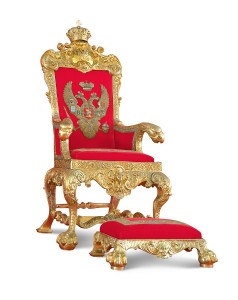Throne Room Tricks January 15, 2012
Author: Beach Combing | in : Medieval , trackbackBeachcombing previously had some fun describing the tricks the ‘civilised’ use to frighten ‘savages’ in jungles and deserts far from the capital cities of Europe. But what about – today’s subject – the tricks that the civilised used when ‘savages’ came to visit them on home ground. Take, for example, the shenanigans found in the throne room of the Byzantine emperors, when a Bulgar or Magyar came from the frozen north.
In front of the emperor’s throne was set up a tree of gilded bronze, its branches filled with birds, likewise made of bronze gilded over, and these emitted cries appropriate to their species. Now the emperor’s throne was made in such a cunning manner that at one moment it was down on the ground, while at another it rose higher and was to be seen up in the air. This throne was of immense size and was, as it were, guarded by lions, made either of bronze or wood covered with gold, which struck the ground with their tails and roared with open mouth and quivering tongue. Leaning on the shoulders of two eunuchs, I was brought into the emperor’s presence. As I came up the lions began to roar and the birds to twitter, each according to its kind, but I was moved neither by fear nor astonishment … After I had done obeisance to the Emperor by prostrating myself three times, I lifted my head, and behold! the man whom I had just seen sitting at a moderate height from the ground had now changed his vestments and was sitting as high as the ceiling of the hall. I could not think how this was done, unless perhaps he was lifted up by some such machine as is used for raising the timbers of a wine press.
Aenea sed deaurata quaedam arbor ante imperatoris sedile stabat, cuius ramos itidem aeneae diversis generis deauratae aves replebant, quae secundum species suas diversarum avium voces emittebant. Imperatoris vero solium erat arte compositum ut in momento humile, excelsius modo. Quam mox videretur sublime; quod immensae magnitudinis, incertum utrum aenei an lignei verum auro tecti, leones quasi custodiebant, qui cauda terram percutientes aperto ore linguisque mobilibus rugitum emittebant. In hac igitur duorum eunuchorum humeris ante imperatoris praesentiam sum deductus. Cumque in adventu meo rugitum leones emitterent, aves secundum species suas perstreperent, nullo sum terrore nulla admiratione commotus quotiam quidem ex his omnibus eos qui bene noverant fueram percontatus. Tercio itaque pronus imperatorem adorans, caput sustuli et quem prius moderata mensura a terra elevatum sedere vidi, mox aliis indutum vestibus poenes domus laquear sedere prospexi; quod quam iter fieret cogitare non potui, nisi forte eo sit subvectus argalio, quo torcularium arbores subvehuntur. [thanks to Clemens for the Latin!]
This is a tenth century text and here the Byzantine Emperor tried to impress Liudprand of Cremona, an Italian: Liudprand had clearly hardened himself before he went in. It would be interesting to know how these tricks were done: how do you make bronze/wood lions roar: was it a trick of water and escaping air or bellows? As to the jumping throne, were there twenty slaves behind the scenes? The smoke and mirrors is reminiscent of the final scenes of the Wizard of Oz.
Of course, the Byzantines were not the only ones to try these tricks. When Odoric of Pordenone visited the court of the Tartars he came across similar games.
In the midst of the palace standes a cisterne of two yards high, which consisteth of a precious stone called Merdochas, and is wreathed about with golde, and at ech corner thereof is the golden image of a serpent, as it were, furiously shaking and casting forth his head. This cisterne also hath a kind of networke of pearle wrought about it. Likewise by the sayd cisterne there is drinke conueyed thorow certeine pipes and conducts, such as vseth to be drunke in the emperors court, vpon the which also there hang many vessels of golde, wherein, whosoeuer will may drinke of the sayd licour. In the foresayd palace there are many peacocks of golde: and when any Tartar maketh a banquet vnto his lord, if the guests chance to clap their hands for ioy and mirth, the sayd golden peacocks also will spread abroad their wings, and lift vp their traines, seeming as if they danced: and this I suppose to be done by arte magike or by some secret engine vnder the ground.
Et in medio palatij est vna pigna altitudinis duorum passuum, quæ tota est de vno lapide pretioso nomine merdochas; et est tota circumligata auro, et in quolibet angulo eius est vnum serpens de auro qui verberatos fortissimé: Habet etiam haec pignaretia de margaritis, et per istam pignam defertur potus per meatus et conductus qui in curia regis habetur; et iuxta eam pendent multa vasa aurea cum quibus volentes bibere possunt. In hoc autem palatio sunt multi pauones de auro; et cùm aliquis Tartarus facit festum domino suo, tunc quando conuiuantes collidunt manus suas præ gaudio et læticia, pauones emittunt alas suas, et expandunt caudas, et videntur tripudiare; Et hoc credo factura arte Magica, vel aliqua cautela subterranea.
Any other throne room tricks for unwitting visitors from out in the sticks? Drbeachcombing AT yahoo DOT com



